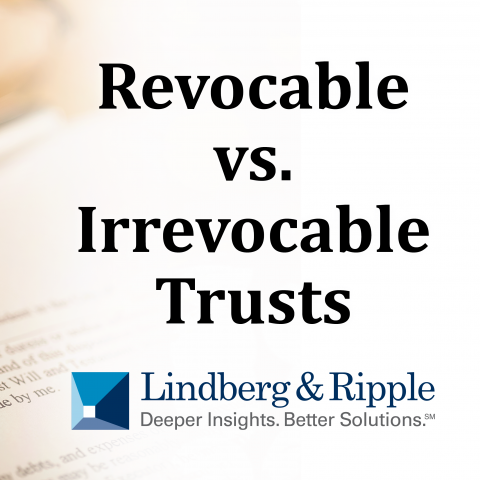Revocable vs. Irrevocable Trusts: Key Differences and Their Role in Estate Planning
When it comes to estate planning, trusts are a powerful tool to ensure that your assets are managed and distributed according to your wishes. Two of the most commonly used types of trusts are revocable trusts and irrevocable trusts. While they share the goal of protecting your estate, they operate very differently, each offering unique advantages depending on your financial goals and personal circumstances. Let’s explore the key differences and when each type might be the right choice for your estate plan.
What is a Revocable Trust?
A revocable trust, also known as a living trust, is a flexible estate planning tool that allows you to manage your assets during your lifetime and specify how they should be distributed upon your death. The most significant characteristic of a revocable trust is that, as the grantor, you retain control over the trust and its assets. You can modify, amend, or even dissolve the trust at any time, which makes it an appealing option for individuals who want flexibility.
Why Use a Revocable Trust?
- Avoiding Probate: One of the primary reasons for creating a revocable trust is to avoid the probate process, which can be time-consuming, costly, and public. Assets placed in a revocable trust pass directly to your beneficiaries without going through probate, allowing for a quicker, more private distribution.
- Flexibility and Control: Since you maintain control over a revocable trust, you can make changes as your financial situation or family dynamics evolve. This is particularly useful if your assets, relationships, or tax considerations change over time.
- Incapacity Planning: In the event that you become incapacitated, a revocable trust can ensure that a designated trustee will manage your assets according to your wishes. This allows for smooth financial management without the need for court intervention.
However, despite these benefits, revocable trusts do not provide protection from creditors and do not offer any tax advantages. The assets in a revocable trust are still considered part of your taxable estate, which is an important consideration for individuals with significant wealth.
What is an Irrevocable Trust?
In contrast, an irrevocable trust is a type of trust that, once established, cannot be easily modified or revoked. When you transfer assets into an irrevocable trust, you effectively relinquish ownership and control of those assets. While this may seem like a significant trade-off, irrevocable trusts offer powerful benefits, particularly for individuals concerned about estate taxes and asset protection.
Why Use an Irrevocable Trust?
- Tax Benefits: Assets transferred to an irrevocable trust are no longer a part of the Grantor’s taxable estate. Additionally, any appreciation of those assets are not subject to estate taxation.
- Asset Protection: Because you no longer own or control the assets in an irrevocable trust, they are shielded from creditors. This makes irrevocable trusts an attractive option for individuals in professions or circumstances where they might face significant liability (e.g., doctors, business owners) or in a divorce settlement.
- Oversight and Management: Irrevocable trusts provide a structure for oversight and management of trust assets for the benefit of the Grantor’s heirs, the ability to invest in entrepreneurial ventures and providing spendthrift protection.
Key Differences Between Revocable and Irrevocable Trusts
| Feature | Revocable Trust | Irrevocable Trust |
| Control | Grantor retains full control; can modify or revoke | Grantor relinquishes control; cannot modify or revoke |
| Asset Protection | No protection from creditors or lawsuits | Provides protection from creditors and lawsuits |
| Taxation | Assets included in taxable estate | Assets excluded from taxable estate |
| Probate Avoidance | Avoids probate | Avoids probate |
| Flexibility | High flexibility to make changes | Little to no flexibility once established |
| Medicaid Planning | Not effective for Medicaid qualification | Effective for Medicaid planning if structured properly |
Which Trust is Right for You?
The decision between a revocable and irrevocable trust depends on your individual estate planning goals. And you may actually want to consider using them in tandem, as they are not mutually exclusive:
- Use a Revocable Trust if you want to maintain control over your assets, prefer flexibility, and your primary concern is avoiding probate. This is ideal for those who may anticipate changes in their estate or family situation and want to make adjustments as needed.
- Use an Irrevocable Trust if your primary goals are tax reduction, asset protection, or Medicaid planning. While irrevocable trusts require you to give up control of your assets, they offer significant long-term financial benefits, especially for individuals with high net worth or those exposed to potential liability.
Conclusion
Both revocable and irrevocable trusts play important roles in a comprehensive estate plan, but the right choice depends on your unique circumstances. In addition, the state or jurisdiction in which you set up a trust (also known as the trust situs) may also be something to consider as part of your estate planning process. At Lindberg & Ripple, we specialize in helping high-net-worth individuals navigate complex estate planning decisions. Whether you are looking to protect your assets, reduce taxes, or ensure a smooth transfer of wealth to your heirs, our experienced team is here to guide you every step of the way.
Contact us today to learn more about how we can help you secure your financial future.
File #7077174.1
